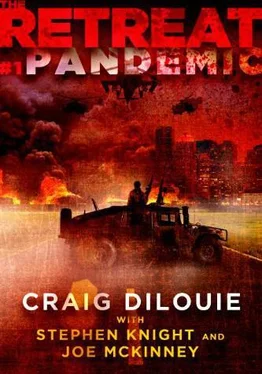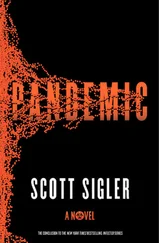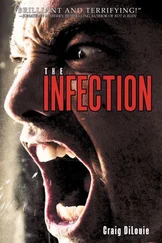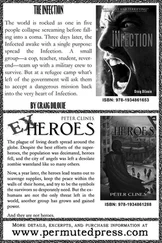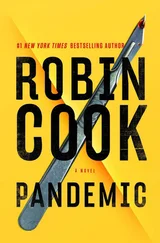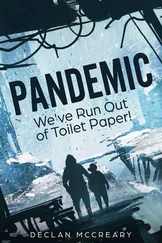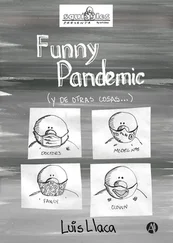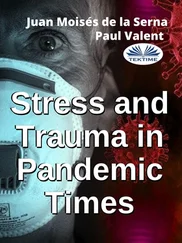Craig DiLouie
with
Stephen Knight and Joe McKinney
THE RETREAT
Episode One: Pandemic
America. Boston. Christ Hospital.
Forty-nine days of quarantine.
At first, it was to shut the sick inside. Later, it was to keep them out.
Outside, the world was dying. The world was going to die laughing.
And the Klowns would own it all.
The sirens had stopped long ago. All day and night, the air outside the hospital filled with heavy weapons fire as the Army fought to save what was left.
The Army was losing.
Dr. John Braddock had fought malaria, cholera, sleeping sickness, kala azar. He’d seen people bleed out of their eyes in Africa and shit themselves to death in droves in India.
He’d never seen anything like the Bug.
He eyed his watch with rising irritation. Chief Nurse Robbins was late.
It was time to get her report. Do the rounds to check the patient charts. Review their dwindling supplies.
He already knew the score. They would find some of the patients dead in their beds and supplies low across the board. But he had to take stock of everything.
Normally, the Chief of Medicine handled that stuff, but she had the Bug, so the job had fallen on him.
He closed his eyes and listened. A woman was crying in Pathology. Distant footsteps marked the progress of one of his skeleton crew.
As a young, idealistic doctor, Braddock had joined Doctors Without Borders. After several years in Asia and Africa, the horrors he witnessed began to wear on him. In Aleppo, Syria, children lined up for measles vaccinations were torn apart in a rocket attack. In southern Sudan, refugees died from malaria after rebels looted his hospital.
He’d come home but had a difficult time reintegrating. America lived in a bubble of prosperity. He regarded his colleagues as petty and competitive. Getting things done required socializing with people he didn’t understand. Hospital administrators and insurance companies constantly told him what he could and couldn’t do to save lives. He didn’t get along.
Braddock resigned from one job after another. Nobody lifted a finger to make him stay. He was a big man, too intense and culturally out of touch. He intimidated people. He started drinking to dull the anger. He had no sense of self. America, his home, began to feel like another foreign land.
Ellen White, Chief of Medicine at Boston’s Christ Hospital, visited Braddock in his shabby motel room and offered him a job: I believe in you, John. She offered him a place he could call home.
He quit the bottle. Stopped fighting the system. Spent years in trauma therapy. He practiced medicine. Over time, he again began to feel like he was making a difference. He literally owed White his life. She’d brought him back from the dead.
Then she caught the Bug. So many of the others had gone to be with their families, leaving thousands of patients in his care. It was an impossible task, but he wouldn’t let her down. He’d show them all, not least himself, what he was made of.
Shoes pounded the floor. He opened his eyes as Robbins approached.
“Dr. Braddock,” she said, her voice edged with panic.
Another crisis. Adrenaline flooded his body. He welcomed it like a drug.
“Soldiers,” she said. “They’re in the hospital.”
“The Army? Here?”
“They have guns.”
“They’re the good guys,” Braddock assured her. “It’s going to be all right.”
At the places he’d been, soldiers usually meant trouble. Guerillas, freedom fighters, Army, paramilitaries. But not in America. In America, soldiers didn’t loot hospitals.
He couldn’t help but feel hopeful. They’d been on their own for months. Maybe the soldiers were here to help. Maybe they’d brought supplies so the hospital could keep functioning.
He asked Robbins why they’d come.
“I don’t know,” she said, fighting tears. “I asked them what they were doing here.” She started crying, her voice escalating. “They said we had to evacuate. They pushed me!”
Braddock glanced over her shoulder. Another nurse watched them from a distance. “You’re Chief Nurse,” he whispered harshly. “Keep it together.”
Seven weeks ago, she’d been overweight. Now her scrubs hung on her rail-thin body. Her sister was quarantined on the fifth floor. She hadn’t heard from the rest of her family in ten days. She was under enormous stress, as they all were. But he couldn’t have her cracking up. They all needed to be at their best, or they wouldn’t get through this.
Robbins took a deep breath. “I’m sorry.”
“Don’t be sorry,” he said in a softer tone. “Just tell me where they are. I’ll get some answers.”
“They went upstairs.”
His heart pounded. “Did they have protection? Masks, gloves—”
“No. I don’t know. They weren’t wearing any when they came in.”
“Christ. How many of them are there?”
“A lot. Ten? Fifteen?”
Braddock rubbed his eyes. He had to find them quickly. The thought of fifteen heavily armed soldiers catching the Bug horrified him to the bone. There’d be a massacre.
Braddock parted the plastic sheeting and entered the quarantine zone. Smiling plague victims slept or stared at the ceiling. Intravenous drips fed them a barbiturate cocktail to keep them sedated. Glazed eyes followed him as he passed.
He shook his head. They shouldn’t have been awake at all.
The stale air stank of disease, sweat and neglected bedpans. It was the height of summer, and the air conditioning and ventilation had been turned off to conserve power. The hospital had become an oven. He heard the steady hiss of breath from hundreds of mouths.
On a warm night six weeks ago, Braddock had been working in the emergency room. He thrived on the pulse of the ER—the rollercoaster of boredom and crisis. Even after everything, he was still an intensity seeker. The volume of admissions was staggering. Not a single patient had a disease. They were all trauma cases—broken bones, lacerations, gunshot and knife wounds. A man with a broken bottle in his ass. A woman with a yolky pulp where her left eye had been. A man partially flayed alive. Most were in deep shock. Those who could speak told stories of horror, about how the people they loved had savaged them.
He’d never seen anything like it. When morning finally came, Braddock was sewing stitches into his ninth stab wound. The victims just kept coming. The wail of sirens filled the city—police vehicles, ambulances, fire trucks. The sky grayed with smoke.
A SWAT team wearing respirator masks brought the first diseased people in armored cars. They dragged them inside by the necks with restraint poles. The doctors sedated them, and orderlies strapped them onto gurneys. The first quarantine ward was established on the third floor. Then another and another until the hospital filled with carriers of the Bug.
After that, the police quarantined the entire hospital, enforced it at gunpoint.
The disease killed the old and the very young, while everybody else suffered from frontotemporal dementia similar to Pick’s Disease. The dementia resulted in a dysexecutive syndrome that manifested as severe aggression.
All of which was a very scientific way of saying that men and women would suddenly decide to go after their loved ones with garden shears for a few hours of torture and murder.
Nobody knew why they laughed.
Pathological laughter could be caused by tumors, drug addiction or chromosomal and neurological disorders making the nervous system go haywire. Of all the possible causes, dementia seemed the most viable.
Читать дальше
